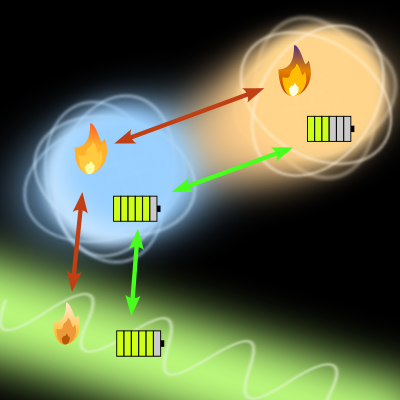Publication of the Physics Laboratory and the LIP in the journal PRX Quantum on April 18, 2023. Communication of the CNRS-INP on June 13, 2023.
In a recent paper, researchers at the Physics Laboratory of ENS de Lyon (LPENSL, CNRS/ENS de Lyon) and at the Parallel Computation Laboratory (LIP, CNRS/ENS de Lyon/Claude Bernard Lyon 1 Univresity/Inria) show that it is possible to coherently extend thermodynamics, which was initially designed to describe energy exchanges between macroscopic systems, to extremely small systems where quantum fluctuations and properties dominate, giving these exchanges completely new characteristics. A study published in the journal PRX Quantum.
Abstract
Originally formulated for macroscopic machines, the laws of thermodynamics were recently shown to hold for quantum systems coupled to ideal sources of work (external classical fields) and heat (systems at equilibrium). Ongoing efforts have been focusing on extending the validity of thermodynamic laws to more realistic, nonideal energy sources. Here, we go beyond these extensions and show that energy exchanges between arbitrary quantum systems are structured by the laws of thermodynamics. We first generalize the second law and identify the associated work and heat exchanges. After recovering known results from ideal work and heat sources, we analyze some consequences of hybrid work and heat sources. We illustrate our general laws with microscopic machines realizing thermodynamic tasks in which elementary quantum systems play the role of simultaneous source of heat and work. Our results open perspectives to understand and optimize the energetic performances of realistic quantum devices, at any scale.

Credits - Elouard and Lombard Latune
Reference: Extending the Laws of Thermodynamics for Arbitrary Autonomous Quantum Systems. Cyril Elouard and Camille Lombard Latune. PRX Quantum, April 18, 2023.
DOI: 10.1103/PRXQuantum.4.020309





